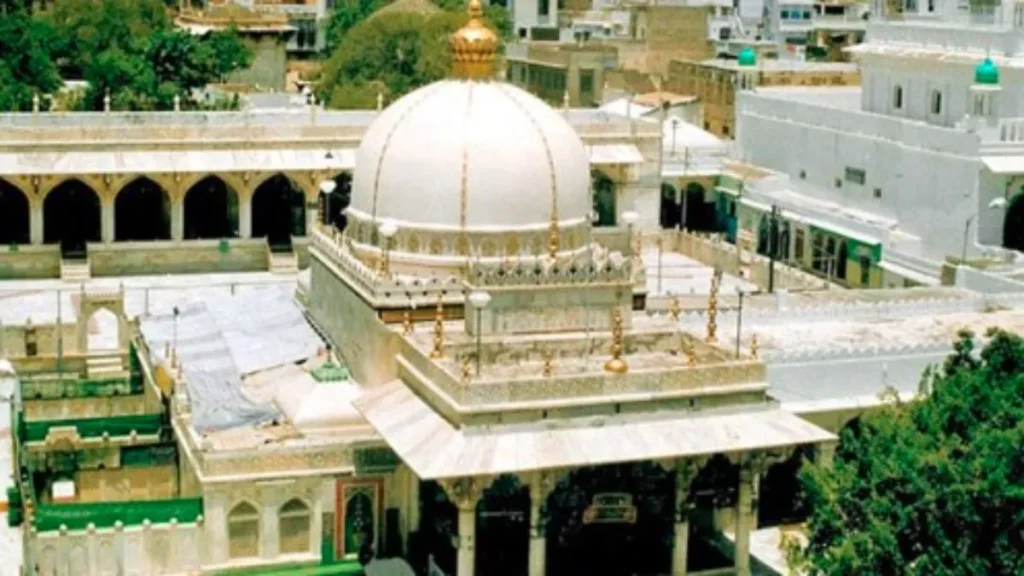Ajmer District: RAJASTHAN
Discover the enchanting blend of spirituality, history, and modern life in Ajmer District, Rajasthan. Explore the revered Ajmer Sharif Dargah, immerse in the vibrant Pushkar Camel Fair, and witness the rich cultural heritage of this captivating region.

Ajmer District, located in the northwestern part of the Indian state of Rajasthan, is a land steeped in history, culture, and spirituality. With its rich heritage, diverse landscapes, and bustling urban centers, the district offers a unique blend of old-world charm and modern dynamism.
The city is home to the revered Ajmer Sharif Dargah, the tomb of Sufi saint Khwaja Moinuddin Chishti. Every year, thousands of devotees from various faiths flock to the Dargah to seek blessings and offer prayers. The annual Urs festival commemorating the saint’s death is a major event, drawing pilgrims and tourists alike.
Beyond its spiritual importance, Ajmer boasts a rich historical background. The magnificent Taragarh Fort, dating back to the 7th century, stands atop a hill and offers panoramic views of the city. The Ana Sagar Lake, a man-made reservoir built by Emperor Anaji, is another picturesque spot where locals and visitors gather for leisurely boat rides and relaxation.
Pushkar, a small town within the district, is globally renowned for its Pushkar Camel Fair, one of the largest livestock and cultural fairs in the world. This vibrant event attracts traders, tourists, and photographers who come to witness the spectacle of thousands of camels and livestock, along with traditional music, dance, and competitions.
The district’s economy is diverse, with agriculture playing a pivotal role. The region’s semi-arid climate supports the cultivation of crops like wheat, barley, and mustard. Apart from agriculture, small-scale industries and handicrafts contribute significantly to the local economy. The exquisite craftsmanship of Ajmer’s artisans is evident in products like traditional tie-and-dye textiles, leather goods, and marble carvings.
Education and culture flourish in Ajmer as well. The prestigious Mayo College, established during the British era, has nurtured generations of leaders and scholars. The district also hosts the Ajmer Literature Festival, a platform that celebrates literary and artistic endeavors.
Transportation infrastructure is well-developed, connecting Ajmer to major cities through rail and road networks. The Ajmer Junction railway station is a vital hub in the region. Additionally, the district’s strategic location on the Golden Quadrilateral highway network enhances its connectivity.
As with any growing urban center, Ajmer faces its share of challenges. Managing urbanization while preserving its historical and cultural heritage is a delicate balance that requires careful planning. Ensuring sustainable development, efficient waste management, and adequate infrastructure are ongoing priorities.
In conclusion, Ajmer District is a captivating blend of spirituality, history, and modern progress. Its iconic landmarks, cultural festivals, and economic activities reflect the essence of Rajasthan’s diversity and heritage. Whether it’s the tranquil devotion at the Ajmer Sharif Dargah or the lively energy of the Pushkar Camel Fair, Ajmer continues to captivate the hearts and minds of those who explore its unique offerings.
Famous Places in Ajmer District
Ajmer District in Rajasthan, India, boasts a variety of famous places that offer a glimpse into its rich history and vibrant culture. From spiritual landmarks to historical forts, here are some of the district’s notable attractions:
Ajmer Sharif Dargah: A renowned Sufi shrine, the Ajmer Sharif Dargah is the final resting place of Khwaja Moinuddin Chishti, a revered Sufi saint. This spiritual hub draws devotees of all faiths who seek blessings and solace.
Taragarh Fort: Perched atop a hill, Taragarh Fort offers panoramic views of Ajmer city. Dating back to the 7th century, the fort showcases intricate architecture and stands as a testimony to the region’s historical significance.
Ana Sagar Lake: Built by Emperor Anaji, this scenic artificial lake provides a peaceful escape. Visitors can enjoy boat rides on the lake’s tranquil waters and unwind in its serene surroundings.
Pushkar: This quaint town within the district is famous for the Pushkar Camel Fair, an annual event that draws traders, tourists, and photographers to witness a vibrant blend of cultural festivities and livestock trade.
Mayo College: A prestigious institution founded during the British era, Mayo College has a rich legacy of education and has contributed to the shaping of leaders and scholars.
Nareli Jain Temple: Known for its stunning architecture, this Jain temple complex stands out with its intricate marble carvings and religious significance, attracting pilgrims and tourists alike.
Adhai Din Ka Jhonpra: An ancient mosque with intriguing architecture, this site holds historical and religious significance, making it a must-visit for history enthusiasts.
Soniji Ki Nasiyan: Also known as the Red Temple, this stunning Jain temple is famous for its intricate gold-leaf decorations and exhibits depicting the Jain concept of the cosmos.
Rangji Temple: A unique fusion of South Indian and Rajput architectural styles, this temple dedicated to Lord Rangji is a visual delight and a prominent spiritual destination.
Prithviraj Smarak: This monument honors the brave warrior Prithviraj Chauhan and features a statue commemorating his valorous deeds.
Foy Sagar Lake: A picturesque reservoir named after a British engineer, Foy Sagar Lake offers a peaceful setting for relaxation and picnics.
Daulat Bagh: Adjacent to the Ana Sagar Lake, this lush garden showcases Mughal-style landscaping and provides a serene environment for visitors to unwind.
These famous places in Ajmer District offer a blend of spirituality, history, and architectural splendor. Each site contributes to the district’s unique charm and invites travelers to explore its cultural tapestry and historical significance.
Read More :-
